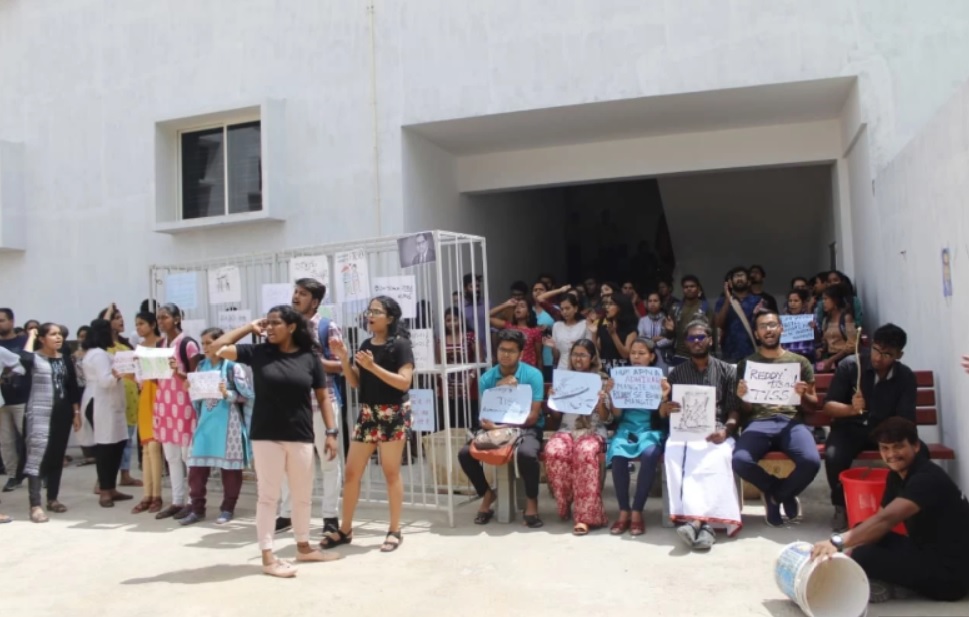On July 9, students at the Tata Institute of Social Sciences (TISS) in Hyderabad protested the administration’s decision of increasing hostel fees. Under the umbrella of Students Action Committee, as many as 13 students went on hunger strike on July 14 after protesting for five consecutive days, demanding hostel accountability and revision of payment method.
The protest began after the TISS administration made a decision to increase the hostel fee from INR 15,000 (USD 219) to INR 54,000 (USD 787) per semester for its recently opened Hyderabad campus. The news infuriated the students who decided to block the campus and resist this decision.
Following the protests, students said that the administration asked the State police to enter the university premises and mediate with the union. With a lot of scrutiny and patrolling, the atmosphere has become intimidating for the students. “Two students who were on hunger strike have been hospitalized. Despite the grave situation, no one from the administration has turned up. Students are feeling determined to continue to protest till our demands are met,” said one of the protesters.
As per the notice, on the fourth day of agitation, a consensus was reached in a meeting between the convener and the students who receive GOI Post-Matric scholarship, and a decision was taken to resume classes from the next day. Professor Vindhya, the acting deputy director, had warned the students through an email that the failure to adhere to this agreement would force the institute “to close down indefinitely”.
However, a large number of students belonging to the minority Scheduled Caste and Scheduled Tribe categories who were present in the meeting confirmed that they did not accept the offer. Despite this, the deputy director forwarded an email, claiming to have reached a consensus directly with the minority students. She asked the Students Action Committee (SAC), a students’ body that was formed last year and is leading the agitation, to call off the strike.
“The meeting, which has been referred to in the notice, was also a clear attempt to cut out the SAC and speak directly to a selected group of students who could be intimidated to accept the administration’s point of view,” students privy to this meeting said.
Condemning the sine die closure of the campus, the Ad hoc faculty said in a statement that it is worrying that instead of engaging with the burning question of diversity and inclusivity in academic spaces, the TISS administration has chosen to shut down the institute. The statement added that this is despite the fact that the protests were democratic and peaceful in nature. At a time when the State is withdrawing from higher education, it is appalling that an institute that has a long and cherished history of working towards social justice has chosen to absolve itself of the responsibility of providing equitable access to education.
“We demand that the TISS administration revoke the sine die immediately, and take all steps necessary to ensure that students from marginalized communities can avail of hostels and other amenities,” G. Arunima, professor at the Center for Women’s Studies, said.
One of the employees familiar with the developments informed NewsClick that the notice by the management has disturbed the entire TISS community. “The administration, during the whole course of 7-8 days since the protests started, has stuck to its guns and has not moved even an inch from its original position,” the employee said.
The private service provider who has received the contract for food and hostel facilities came up with a rule that requires students to pay the entire amount of hostel and mess-fees of each semester at its beginning. The non-fulfillment of the payment prohibits students from joining the hostel. Several students belonging to the minority Scheduled Caste and Scheduled Tribe category were among the first to get affected by this rule and were forced to drop out.





